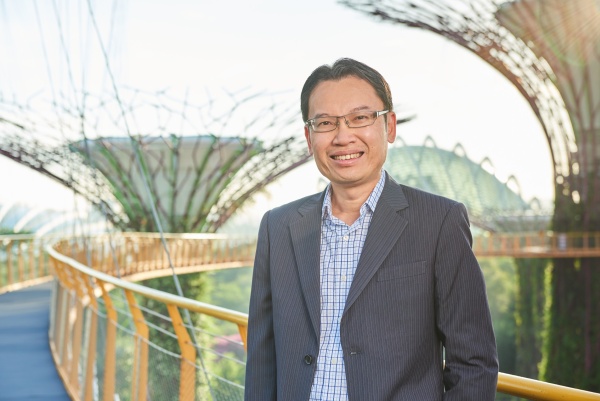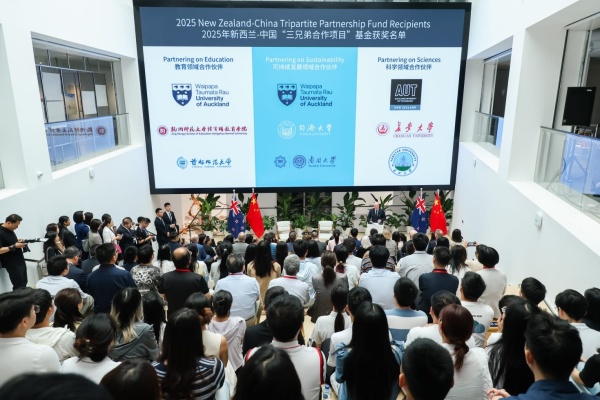Search
Showing 10 of 1193 results for Value-priced treatments https://simplemedrx.top
-
Special offer on ICEF Academy NZ Education Agent Course
ICEF Academy, the professional training arm of ICEF, has launched a new online course that is designed to equip education agents with the resources they need to provide the highest quality of guidance to students wishing to study in Aotearoa New Zealand.
The New Zealand Education Agent Course (NZEAC) has been developed in collaboration with Education New Zealand Manapou ki te Ao (ENZ) and adds to the ICEF Academy’s portfolio of destination training.
ICEF is now offering a promotional rate for readers of E-News. Education agents can use the code NZEAC30 during checkout to purchase the exam with a 30% discount. This offer is available until 31 December 2024.
Since its 27 June launch date, the course is already proving popular. As of 14 August, 618 education agents have enrolled in the course, 532 have started, 127 have completed the course, and 16 have graduated.
Commenting on the course’s uptake, Sahinde Pala, General Manager Sector Services at ENZ said it was encouraging to see that the course was proving popular amongst education agents.
About the course itself, she said “The course offers comprehensive insights for education agents to help them advise students on study in Aotearoa New Zealand. It will help them become better informed about the country’s policies, culture and education system so that their advice to students is current, accurate and helpful.”
In undertaking this course, education agents will have the opportunity to study modules which will encompass New Zealand’s culture and history, education system, work policies and legislation, as well as effective student recruitment and support. The course is self-paced and free, however those seeking to highlight their knowledge as a destination New Zealand specialist have the option to undertake a paid certification exam, for which the 30% discount applies.
Education Agents interested in learning more about the New Zealand Education Agent Course can learn more at: New Zealand Education Agent Course (NZEAC) | ICEF Academy. Education agents are also reminded to register with AgentLab to keep up-to-date with all agent-related news and information.
-
Proposals sought for the New Zealand – China ECE Symposium
This year’s theme is Digital Transformation in Early Childhood Education. We are seeking session proposals from academics, professionals, and practitioners in the Early Childhood Education (ECE) or International Education fields for the fifth New Zealand-China Early Childhood Education Symposium.
Refer to this Call for Proposals document and the event landing page for more information. Be sure to submit your proposal by 13 October 11:59pm NZT.
The last ECE Symposium was held in Nanjing, China in September last year and three New Zealand presenters travelled to present. You can read about this previous event here.
If you have any questions about the upcoming event, please contact china@enz.govt.nz.
-
Viet Nam Market Insights: Opportunities and Challenges for New Zealand's PTEs and ELS Providers
On 29 August, Education New Zealand Manapou ki te Ao (ENZ) held an Insights Accelerator session for representatives from Private Training Establishments (PTEs) and English Language Schools (ELS) across New Zealand. ENZ’s Market Manager - Viet Nam, Van Banh, delivered a presentation that outlined Viet Nam’s current market trends, barriers to student recruitment, and essential tips for providers aiming to strengthen their presence in this dynamic country.
The session had 30 representatives from 20 PTEs attending, demonstrating how New Zealand education providers are recognising the opportunities for growth given the country’s expanding economy and growing middle class. As Van noted " Viet Nam offers significant growth opportunities, but success will require a tailored approach that addresses both the evolving demands of Vietnamese students and the competitive landscape."
The demand for English language skills is particularly high in business, technology, and education, as Vietnam continues its global integration. This makes New Zealand's high-quality ELS programmes attractive.
For PTEs, the country's growing economy requires a workforce with practical, vocational skills, which New Zealand’s providers are well-positioned to offer. Many PTEs and ELS institutions provide pathway programmes that help students transition into higher education or industries with globally recognised qualifications, Vietnamese students are attracted to New Zealand programmes that enhance employability both in Viet Nam and internationally.
Van added that despite these opportunities, there are some challenges.
“Tough competition from other study destinations and the changing preferences of Vietnamese students—away from traditional English and vocational courses—will require providers to adapt and innovate. The country's rapid development and young population present long-term growth potential, but strategic planning and market responsiveness will be key,” said Van.
The slides from the Accelerator Session can be found here. You can also watch a recording of the session here - https://youtu.be/KQE22JV1t2w
-
Update from Immigration New Zealand
Peak processing season in full swing
Immigration New Zealand (INZ) has seen an increase in applications submitted during September 2024, ahead of the 1 October visa fee and levy increase and because of our ‘apply early’ messaging.
In September 2023, approximately 3,104 international student visa applications were submitted and in September 2024, approximately 6,893 international student visa applications have been submitted, an increase of 122%.
Now that we are in our peak processing period, we expect these processing times to grow as we receive a higher volume of applications. Students should get their visa application in at least 3 months before they plan to travel to New Zealand for the first semester of 2025.
By now, most students should have received an offer of place from their chosen education provider. Anyone expecting to study in the first term of 2025 should apply now.
We acknowledge that some students who are waiting on key study documentation are unable to apply 3 months ahead. In these cases, they should apply as soon as they have all of their documents, but they need to be aware that late applications may not be processed in time for them to start studying.
Immigration New Zealand has three student processing sites in New Zealand, and has allocated more staff to processing student visas, compared to last year’s peak.
Ensure you submit a complete applicationTo avoid delays, we encourage students, agents and advisers to follow the advice in our student visa information sheets. If they do not include all the required documents when they submit their application, it may be declined.
Applications that have a statement of purpose letter written by the student, telling us about their personal circumstances and plans in New Zealand, help us assess their intent. If a student intends to apply for another visa after study, they should declare this. Students are allowed to apply for another visa after they finish studying.
-
ENZ Insights Webinar: New Zealander's Perceptions of International Students, 2024 Results Wednesday 20 November, 12:00-12:45
Education New Zealand Manapou ki te Ao has been monitoring New Zealander’s perceptions of international students since 2016.
A thriving and sustainable international education sector needs the support and buy-in of New Zealanders. Join this webinar with Marie Clark, Director Insights, to hear the results of the November 2024 edition of the survey.
You will hear:
-
The issues of most importance to New Zealanders
-
Perceptions about New Zealand’s economy and what things are most important to improve it
-
Perceptions of the social, cultural, and economic benefits of international education/students
-
Perceptions about the number of international students in New Zealand
If you would like to attend this webinar, please register via this page - Microsoft Virtual Events Powered by Teams.
This session will be recorded, and the slides and recording made available on Intellilab following the webinar.
-
-
Advertising opportunity for Japan’s 2025 New Zealand Study Guidebook
The KBUNSHA New Zealand Study Guidebook is a trusted publication and is the only one of its kind supported by the New Zealand Embassy in Tokyo and Education New Zealand Manapou ki te Ao (ENZ). KBUNSHA distributes 20,000 copies of the study guidebook to Japanese schools, universities and education organisations as well as education fairs and seminars.
ENZ Business Development Manager – Japan, Tomomi Kontani said advertising here is a great opportunity to leverage an increased demand for information on New Zealand’s education offering.
“We are continuing to see significant interest in New Zealand as an education destination from students and their parents, schools, and education agents here in Japan” she said.
“This is a great opportunity to showcase what makes New Zealand unique, especially in the regions. Destination marketing plays a key role in student attraction for a market like Japan with a tourism focus,” Tomomi added.
The guidebook’s last edition was distributed at the annual student fair and stakeholder focus events hosted by ENZ Japan. The events attracted around 1,000 people. The guidebook remains the main information source ENZ refers to and distributes at upcoming events in 2025.
Advertisement rates for individual providers range from approx. $2,560 NZD to $6,120 NZD for guidebook and or website listings. With the ‘Premier Plan’ and ‘Advertorial Plan’, the school logo will be listed on the new scholarship campaign page built by KBUNSHA. Individual providers can download the proposal here. Advertising copy can be provided in English.
For regional groups, download the proposal here for further details on the guidebook and pricing (approx. $2,200 NZD for a two-page colour advertisement and $3,300 NZD for a four-page colour advertisement).
Bookings must be made by 27 June 2025 directly with KBUNSHA. For more information, visit the KBUNSHA website here. The 2024 guidebook can be viewed here.
KBUNSHA contact:
Minori Takahashi (Director)
Tel: +81-3-3234-1744
Email: minori@kbunsha.com
-
Felix Loh: kūwaha a symbol of enduring ties to New Zealand
Now chief executive of the stunning and expansive botanical attraction that is Singapore’s Gardens by the Bay, Felix is delighted that it was selected as the site for a Māori kūwaha, or carved doorway, which feels personally symbolic to him.
Recently unveiled by Prime Minister Jacinda Ardern, the kūwaha celebrates the long-standing friendship between Aotearoa New Zealand and Singapore. “New Zealand has a special place in my heart, and I am honoured to host this precious Māori artefact. I hope the kūwaha will be a symbol of our friendship for many years to come.”
New Zealand now feels like a second home to Felix, but he shocked his parents and perplexed the scholarship selection committee back in 1988 when he told them he wanted to study horticulture at Massey University.
“I knew that Massey was well-known as an agricultural centre of excellence, and that horticulture was a very popular course,” he says. “But they were puzzled and asked me why I wanted to be a farmer in an urban city state like Singapore.
“My Dad did not speak to me for a few years, because Asians all want their kids to be lawyers, engineers, and doctors, and I chose to be a plant doctor instead. But I never regretted that decision.”
Felix says he felt welcome from the moment he arrived in New Zealand and enjoyed his four years as an international student so much he would have stayed on if he could. But the terms of his scholarship meant he needed to return to Singapore.

The Māori kūwaha recently unveiled at Gardens by the Bay.
No such thing as a stupid question
A less formal approach to education, with an emphasis on inquiry and collaborative learning, proved an initial challenge for Felix but ended up being one of the reasons he rates his New Zealand education experience so highly.
“At my first class we were told that we were expected to ask questions. This was the first time that I heard the phrase ‘there’s no such thing as a stupid question’,” he says. “That shook me, because in Singapore in those days nobody answered a question in class unless they were sure they had the right answer. For the first time, someone was willing to explore an alternative point of view.”
He turned up to English classes thinking it would simply be language tuition but discovered it was all about writing for your audience, with essays to be critiqued by classmates. “I initially questioned why fellow students would judge my work, but I quickly understood the value in taking on board a diversity of views to refine an idea or get a better product.”
And group project work certainly provided a life lesson for Felix, who had been conditioned to individual success based on exam results. “Not only did we have to work in groups, but we couldn’t choose our project partners,” he says.
“I’ll never forget the lecturer telling us that when we get to the workplace, we cannot choose our boss or even our colleagues, so we need to be able to work with different people. I learned that New Zealanders place people at the centre of what they do, and that we need to learn to appreciate the input of others.”
“I learned that New Zealanders place people at the centre of what they do”
Felix says his New Zealand education set him up for life-long learning which has helped to drive his career success. “You’ve got to learn and unlearn throughout your whole lifetime. It’s not so much about the content, but about being curious and knowing where to go for the answers.”
Friendships lead to enduring ties
It is through the people he met that he has forged an enduring relationship with New Zealand. Fellow churchgoers and schoolmates became life-long friends and “a moral and emotional support base” over the years. He has returned to New Zealand many times and stays in touch with former lecturers and teaching staff, some of whom are now plant suppliers for him in his role at Gardens by the Bay.

Felix at Gardens by the Bay.
“When I took on this job, one of my first trips was to go back to New Zealand to source new plants for our temperate Flower Dome. I visited a number of nurseries, just knocking on their doors, and I was made to feel so welcome. It just felt like I was at home.”
The world is a very different place from what it was in the 1990s, but Felix says the value of international education remains as important as ever.
“International education helps us to understand other perspectives better and demystify misconceptions we have about each other.
“In today’s uncertain world it is always good to have friends in other places. You discover that we have more things in common than set us apart.”
-
Fermented flour a food waste breakthrough
Ninna Granucci, a former University of Auckland international student, is part of a new generation of thinkers contributing solutions with out-of-the-box thinking.
Ninna grew up in Brazil and saw for herself the amount of food waste primary producers there generated. Learning about the scale of the problem globally, she resolved to apply her skills to help bring about change.
“I wanted to use science in an area which fascinates me –microbiology and specifically, fermentation – to try and find a solution to this huge problem.”
University of Auckland a great place for new ideas
Ninna chose to study for her PhD in Biological Sciences under Dr Silas Villas-Boas at the University of Auckland in 2014. “The university environment was a great place for new ideas, to promote the spark to find solutions to problems, with the scientific approach to support it.”
It clearly worked. After only 18 months, she had a breakthrough in the lab which she knew could make a real difference. She refined a fermentation process to successfully convert waste pulp and peel from selected fruit and vegetables into a nutritious flour. Widening the range of ingredients in her trial, she proved she was on to something.
Data from the UN’s Food and Agriculture Organisation (FAO)shows that almost 32 percent of plant-based product is wasted annually. Ninna’s technology has the potential to make substantial progress on this.
It turned out that the ingredients also tick all the boxes for health and sustainability-conscious consumers: high protein, high fibre, low calorie, gluten free, rich in vitamins, minerals and natural antioxidants. And the bonus is that they also have lowest CO2 footprint compared with other ingredients in the market today.
Entering her prototype into the University’s Velocity 100K Business Idea Challenge sparked media interest and a flurry of inquiries from supermarkets and other businesses wanting to buy the product. “That was when we realised it was not only an academic project but also something which could be much bigger and could help to address the problem of food waste,” Ninna says.
Green Spot Technologies has global plans
With support from Velocity, she and Silas co-founded sustainable food innovation company Green Spot Technologies, which has ambitious plans to go global. Ninna is now CEO and based in Toulouse, France, where the business is established in a start-up accelerator environment and employs 15 people.
But back in the early days, it was pretty nerve-wracking. “My plan was to complete my PhD first and then set up a company based around the project. But after the success in the Velocity Challenge, we decided the time was right to forge ahead with the start-up. It was quite challenging. My background is all scientific, I didn’t have any experience in business, and I had a lot to learn.”
She is grateful for the support she got at the University of Auckland and believes that her career path would never have progressed as quickly if she hadn’t chosen New Zealand as a study destination.
“I give a lot of credit to New Zealand for how things worked out”
“New Zealand was the catalyst,” she says. “I managed to secure a scholarship through Callaghan Innovation available to students looking to add value to waste streams. It allowed me to focus on the work and find opportunity. I give a lot of credit to New Zealand for how things worked out.”
Ninna worked in Auckland with other international students from around the world and says that, too, helped contribute to her success. “When you are in the same situation you can support each other and that was super important during my PhD.”
New Zealand education the right decision
Ninna remains passionate about sustainability and reducing food waste. It is at the heart of her business and is important to her personally. The mission of Green Spot Technologies is “challenging the food waste paradigm to feed the future”. The company has won multiple awards, both in New Zealand and in Europe, highlighting the unique nature of its technology and products.
With food insecurity spreading to hundreds of millions of people around the world, the UN has set a Sustainable Development Goal (SDG) to halve food waste by 2030. It is an ambitious target and needs innovative thinkers like Ninna to make it achievable.
“I think it is incredible that we waste so much food, knowing that we need more food in the world. It doesn’t make any sense, but it motivates me to work on solutions,” she says.
The decision to study in New Zealand was a critical part of Ninna’s journey from international student to international businesswoman and innovator. “I could not have imagined that it would lead to such huge changes in my life in such a short time,” she says.
“A New Zealand education provides a truly enriching experience. I really think I made the right decision.”
-
Following his own path – International student builds life, family, and community in New Zealand
Luke Qin has never been afraid of a challenge. Born in Sichuan, China, his childhood was a rich mix of classical Chinese literature, table tennis, badminton, basketball, football, and music.
Early intensive schooling means he can read, write, speak, think and dream in Chinese and draw on traditional Chinese virtues, but a desire to follow his own path, experience something new and explore education options overseas, led him to New Zealand as a high school student.
Selecting New Zealand was a relatively easy choice at the time – English-speaking, safe, ‘clean and green’ and affordable – it ticked all the necessary boxes. But his desire to test himself drew him to Christchurch because “fewer Chinese students there” meant he would have no choice but to fully immerse himself in the new environment.
And what an immersion it was. Luke credits his first years at Linwood High School as the perfect place to experience “an excellent introduction to the New Zealand way of life” and in his first year in New Zealand, he was playing on the wing for Linwood High School’s First XV rugby team!

“With a little help from All Black stars!” Luke tapped his rugby passion to enlist support for the Dragonboat Festival in Wellington from All Blacks Ardie Savea (left) and Dane Coles.
“I wasn’t very big and didn’t know the rules of the game when I arrived, but I had some wheels back then.” Luke explains. If it looked like trouble was coming my way, I’d just try to outrun it!” But he also knew he had to prove himself to his teammates. Once, while tackling his opposite wing, a strapping Samoan teammate joined in and sent them all to the ground. “I felt something hot dripping down my forehead but charged straight back into the ruck, only to be dragged off the field and sent to the hospital.” Three stitches later, he knew he had earned the respect of his teammates and become ‘one of the boys’.
Luke credits his school experience with developing his self-belief and preparing him for what was to come, through his university years and beyond.
After graduating with a Bachelor of Commerce from the University of Canterbury, he relocated to Wellington to join the banking industry, and completed a Master in Applied Finance from Victoria University of Wellington. He then continued on with his quest for lifelong learning and experience by achieving qualifications in Sustainable Finance, Te Reo Māori, Medical Co-Response, Citizen diplomacy and Urban Fire and Rescue, and volunteering for a number of causes.
His banking experience broadened, and several promotions later he joined Kiwibank in Auckland, leading the development of its International Strategy and Trade Finance offering, and working closely with NZ Inc partners to help New Zealand exporters and importers with risk mitigation and working capital funding.
Nowhere has his quest for a challenge been more evident than in his decision to become a volunteer firefighter 10 years ago.
“My younger self had been watching ‘Spiderman’ and saw Peter Parker leap into a burning building to save the day. At the time I thought, ‘I wonder if I could do that?’ Then I heard a call for volunteers from the NZ Fire Service on the radio while driving to work so decided to contact my local fire brigade in Seaview, Lower Hutt.”
“I thought I might be the first Asian volunteer in the station, but I was beaten to it by a Chinese lady.”
“The Fire Service is where you find the real New Zealand,” says Luke.
“Teachers, accountants, plumbers, builders, people from all walks of life - all bonded by the same commitment to serve their community. The camaraderie and environment was addictive.”
There, with the support of Fire and Emergency New Zealand, he completed the Sky Tower Stair Challenge with fellow firefighters from across the country to raise funds for Leukaemia and Blood Cancer New Zealand.
Scaling 1103 steps and 51 flights of stairs in full fire-fighting gear with a steel cylinder on his back was one of the most physical tests he has put himself through.

1,103 steps and 51 flights of stairs behind him, Luke was happy to complete the Sky Tower Stair Challenge - “Man of Steel” with other firefighters dressed in full gear with steel cylinders on their backs to raise funds for leukaemia and blood cancer in New Zealand.
“I have benefitted so much from all the opportunities and adventures since coming to New Zealand, especially from my volunteer roles. It’s a small way I could repay my second home for its kindness.”
“I hope I can encourage more international students and members of our diverse ethnic communities in New Zealand to become volunteers and join activities that benefit the community. There is so much we have to offer, and the reward in terms of friendships and life skills is amazing.”

From Sichuan to Wellington waterfront, leading the Dragon Dance during Chinese New Year Parade.
Luke Qin’s journey as an international student began with a desire to immerse himself in a new environment. Grateful to his family, friends, colleagues, and mentors for the opportunities and adventures New Zealand has given him, he takes pride in being able to go home whichever way he travels between his ‘little shire’ in Sichuan and ‘Middle Earth’ New Zealand.
-
Prime Minister unveils 2025 Tripartite Fund recipients at Fudan University
During his remarks at Fudan University, Prime Minister Christopher Luxon announced the 2025 New Zealand–China Tripartite Partnership Fund recipients, as well as plans for a second high-level Education Forum to be held during China Annual Conference and Expo for International Education (CACIE) 2025.

2025 marks 20 years of the New Zealand – China Tripartite Partnership Programme. Photo credit: New Zealand Trade & Enterprise.
ENZ congratulates the following researchers whose projects exemplify the high-quality research collaboration between our two countries:
-
Dr Fiona Ell (University of Auckland): Working with Hangzhou Normal University and Capital Normal University to enhance mathematics and science teacher education through comparative studies and exchanges.
-
Dr Sihong Wu (University of Auckland): Partnering with Tongji and Nankai Universities on sustainable production and carbon neutrality in manufacturing joint ventures.
-
Dr Yiming Ma (Auckland University of Technology): Collaborating with Chang’an and Yangtze Universities to explore mechanisms behind silent earthquakes.
Dr Fiona Ell said she is looking forward to working with her Chinese research partners to enhance mathematics and science teacher preparation, an important focus for education systems in both New Zealand and China.
“Our study brings together teacher educators from two Chinese universities, and teacher educators at the University of Auckland to exchange ideas and techniques for mathematics and science teacher preparation. The Tripartite grant allows us to visit each other, see teacher education practices in each country and compare policy directions in teacher education,” she said.
This will enhance the understanding and skills of all participants and help us find ways to improve mathematics and science teacher education in both countries,” Dr Ell added.
The Tripartite Fund, managed by ENZ in collaboration with several government agencies, supports strategic research partnerships between one New Zealand and two Chinese universities. The programme celebrates its 20th anniversary in 2025.
Learn more about the Tripartite Partnership Fund here.

Professor Nic Smith, Vice-Chancellor Te Herenga Waka – Victoria University of Wellington exchanges a Memorandum of Understanding with Fudan University President, Li JIN. Photo credit: New Zealand Trade & Enterprise.
Another key part of the event was Victoria University of Wellington renewed an agreement with Fudan University to revitalise the relationship, achieve resumption of student flows, and pursue research cooperation in the areas of public health, bio-tech and climate science.
-

